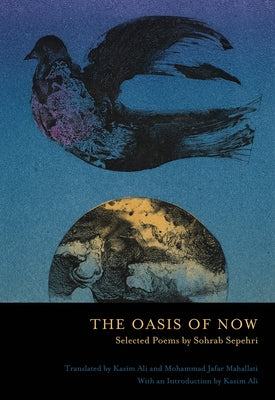Description
The Oasis of Now is the first U.S. book publication of the works of Sohrab Sepehri (1928-1980), one of the major Iranian poets of the twentieth century. Well-versed in Buddhism, mysticism, and Western traditions, Sepehri mingled Western concepts with Eastern ones, creating a poetry unsurpassed in the history of Persian literature. In Iran, his Persian verses are often recited in public gatherings and lines from them were used as slogans by the protesters in 2009. This first full-length American volume collects poems from three of Sepehri's most important books, including the highly acclaimed Water's Footfall.
I want to know:
Why is a horse noble and the dove beloved
but no one keeps a pet vulture in a gilded cage.
Why is the humble clover trodden upon rather than the red tulip.
I want to see anew and wash the words of the world
in wind and rain.
Sohrab Sepehri wrote the poems collected in The Oasis of Now after traveling through Japan, China, and India, where he was exposed to the arts of those countries as well as the spiritual disciplines of Buddhism, Taoism, and Hinduism. This book is crucial for anyone interested in Iranian arts and culture.
Kazim Ali is author of ten books of poetry, fiction, essays, and translations. He is an associate professor at Oberlin College and founding editor of Nightboat Books.
Mohammad Jafar Mahallati is Presidential Scholar in the religion department of Oberlin College. He served as Iran's ambassador to the United Nations from 1987 to 1989 and was instrumental in brokering a peace agreement between Iran and Iraq during that time.
Author: Sohrab Sepehri
Publisher: BOA Editions
Published: 11/05/2013
Pages: 96
Binding Type: Paperback
Weight: 0.30lbs
Size: 8.90h x 5.90w x 0.40d
ISBN13: 9781938160226
ISBN10: 1938160223
BISAC Categories:
- Poetry | Middle Eastern
- Philosophy | Religious
- Religion | Islam | General
About the Author
Sohrab Sepehri: Sohrab Sepehri was born in 1928 on a journey between Kashan, his family's home, and Qum. An acclaimed painter, Sepehri published numerous volumes during his lifetime and traveled widely throughout the world, including Europe, South Asia, the Middle East, China and Japan, the United States and South America. Many of his poems were influenced by his relationship with nature, and his studies of Eastern philosophy and visual arts and were often composed in a cadence similar to spoken language, considered a radical innovation at the time. Sepehri died in 1980 and in Iran is considered to be one of the most important poets of the twentieth century.

